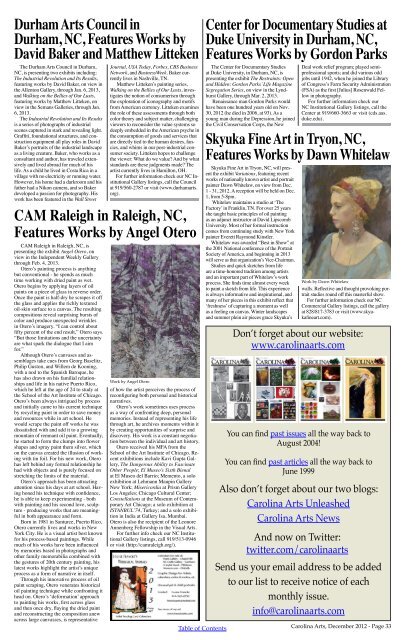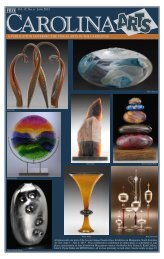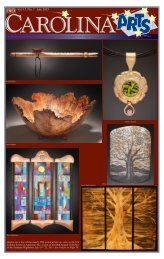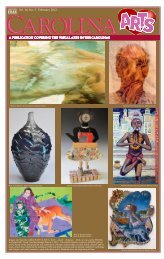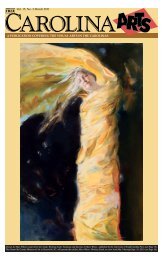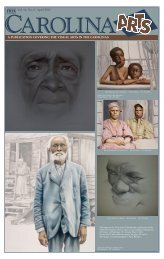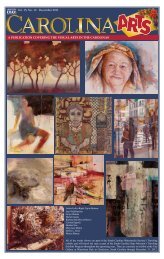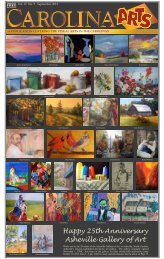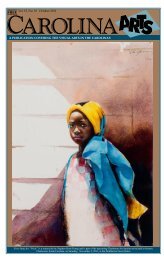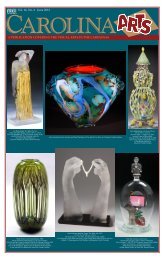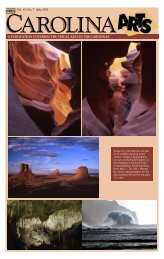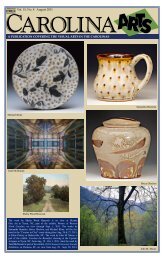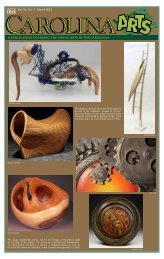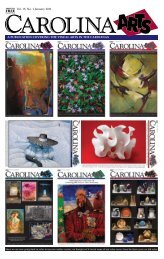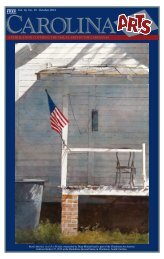NC Institutional Galleries - Carolina Arts
NC Institutional Galleries - Carolina Arts
NC Institutional Galleries - Carolina Arts
Create successful ePaper yourself
Turn your PDF publications into a flip-book with our unique Google optimized e-Paper software.
Durham <strong>Arts</strong> Council in<br />
Durham, <strong>NC</strong>, Features Works by<br />
David Baker and Matthew Litteken<br />
The Durham <strong>Arts</strong> Council in Durham,<br />
<strong>NC</strong>, is presenting two exhibits including:<br />
The Industrial Revolution and Its Results,<br />
featuring works by David Baker, on view in<br />
the Allenton Gallery, through Jan. 6, 2013,<br />
and Walking on the Bellies of Our Lusts,<br />
featuring works by Matthew Litteken, on<br />
view in the Semans <strong>Galleries</strong>, through Jan.<br />
6, 2013.<br />
The Industrial Revolution and Its Results<br />
is a series of photographs of industrial<br />
scenes captured in stark and revealing light.<br />
Graffiti, foundational structures, and construction<br />
equipment all play roles in David<br />
Baker’s portraits of the industrial landscape<br />
as a living creature. Baker, who works as a<br />
consultant and author, has traveled extensively<br />
and lived abroad for much of his<br />
life. As a child he lived in Costa Rica in a<br />
village with no electricity or running water.<br />
However, his home had a darkroom and his<br />
father had a Nikon camera, and so Baker<br />
developed a passion for photography. His<br />
work has been featured in the Wall Street<br />
CAM Raleigh in Raleigh, <strong>NC</strong>, is<br />
presenting the exhibit Angel Otero, on<br />
view in the Independent Weekly Gallery<br />
through Feb. 4, 2013.<br />
Otero’s painting process is anything<br />
but conventional - he spends as much<br />
time working with dried paint as wet.<br />
Otero begins by applying layers of oil<br />
paints on a piece of glass in reverse order.<br />
Once the paint is half-dry he scrapes it off<br />
the glass and applies the richly textured<br />
oil-skin surface to a canvas. The resulting<br />
compositions reveal surprising bursts of<br />
color and produce unexpected wrinkles<br />
in Otero’s imagery. “I can control about<br />
fifty percent of the end result,” Otero says.<br />
“But those limitations and the uncertainty<br />
are what spark the dialogue that I aim<br />
for.”<br />
Although Otero’s canvases and assemblages<br />
take cues from Georg Baselitz,<br />
Philip Guston, and Willem de Kooning,<br />
with a nod to the Spanish Baroque, he<br />
has also drawn on his familial relationships<br />
and life in his native Puerto Rico,<br />
which he left at the age of 24 to study at<br />
the School of the Art Institute of Chicago.<br />
Otero’s been always intrigued by process<br />
and initially came to his current technique<br />
by recycling paint in order to save money<br />
and resources while in art school. He<br />
would scrape the paint off works he was<br />
dissatisfied with and add it to a growing<br />
mountain of remnant oil paint. Eventually,<br />
he started to form the clumps into flower<br />
shapes and spray paint them silver, which<br />
on the canvas created the illusion of working<br />
with tin foil. For his new work, Otero<br />
has left behind any formal relationship he<br />
had with objects and is purely focused on<br />
stretching the limits of the material.<br />
Otero’s approach has been attracting<br />
attention since his days at art school. Having<br />
honed his technique with confidence,<br />
he is able to keep experimenting - both<br />
with painting and his second love, sculpture<br />
- producing works that are meaningful<br />
in both appearance and form.<br />
Born in 1981 in Santurce, Puerto Rico,<br />
Otero currently lives and works in New<br />
York City. He is a visual artist best known<br />
for his process-based paintings. While<br />
much of his works have been influenced<br />
by memories based in photographs and<br />
other family memorabilia combined with<br />
the gestures of 20th century painting, his<br />
latest works highlight the artist’s unique<br />
process as a form of narrative in itself.<br />
Through his innovative process of oil<br />
paint scraping, Otero venerates historical<br />
oil painting technique while confronting it<br />
head on. Otero’s ‘deformation’ approach<br />
to painting his works, first across glass<br />
and then once dry, flaying the dried paint<br />
and reconstructing the composition anew<br />
across large canvasses, is representative<br />
Journal, USA Today, Forbes, CBS Business<br />
Network, and BusinessWeek. Baker currently<br />
lives in Nashville, TN.<br />
Matthew Litteken’s painting series,<br />
Walking on the Bellies of Our Lusts, investigates<br />
the notion of consumerism through<br />
the exploration of iconography and motifs<br />
from American currency. Litteken examines<br />
the role of these assessments through both<br />
color theory and subject matter, challenging<br />
viewers to reconsider the value systems so<br />
deeply embedded in the American psyche in<br />
the consumption of goods and services that<br />
are directly tied to the human desires, fancies,<br />
and whims in our post-industrial consumer<br />
society. Litteken hopes to challenge<br />
the viewer: What do we value? And by what<br />
standards are these judgments made? The<br />
artist currently lives in Hamilton, OH.<br />
For further information check our <strong>NC</strong> <strong>Institutional</strong><br />
Gallery listings, call the Council<br />
at 919/560-2787 or visit (www.durhamarts.<br />
org).<br />
CAM Raleigh in Raleigh, <strong>NC</strong>,<br />
Features Works by Angel Otero<br />
Work by Angel Otero<br />
of how the artist perceives the process of<br />
reconfiguring both personal and historical<br />
narratives.<br />
Otero’s work sometimes uses process<br />
as a way of confronting deep, personal<br />
memories. Instead of representing his life<br />
through art, he archives moments within it<br />
by creating opportunities of surprise and<br />
discovery. His work is a constant negotiation<br />
between the individual and art history.<br />
Otero received his MFA from the<br />
School of the Art Institute of Chicago. Recent<br />
exhibitions include Kavi Gupta Gallery,<br />
The Dangerous Ability to Fascinate<br />
Other People; El Museo’s Sixth Bienal<br />
at El Museo del Barrio; Memento, a solo<br />
exhibition at Lehmann Maupin Gallery<br />
New York; Misericordia at Prism Gallery<br />
Los Angeles; Chicago Cultural Center;<br />
Constellations at the Museum of Contemporary<br />
Art Chicago; a solo exhibition at<br />
ISTANBUL’74, Turkey; and a solo exhibition<br />
in India at Gallery Isa, Mumbai.<br />
Otero is also the recipient of the Leonore<br />
Annenberg Fellowship in the Visual <strong>Arts</strong>.<br />
For further info check our <strong>NC</strong> <strong>Institutional</strong><br />
Gallery listings, call 919/513-0946<br />
or visit (http://camraleigh.org/).<br />
Table of Contents<br />
Center for Documentary Studies at<br />
Duke University in Durham, <strong>NC</strong>,<br />
Features Works by Gordon Parks<br />
The Center for Documentary Studies<br />
at Duke University, in Durham, <strong>NC</strong>, is<br />
presenting the exhibit The Restraints: Open<br />
and Hidden: Gordon Parks’ Life Magazine<br />
Segregation Series, on view in the Lyndhurst<br />
Gallery, through Mar. 2, 2013.<br />
Renaissance man Gordon Parks would<br />
have been one hundred years old on Nov.<br />
30, 2012 (he died in 2006, at 93). As a<br />
young man during the Depression, he joined<br />
the Civil Conservation Corps, the New<br />
Skyuka Fine Art in Tryon, <strong>NC</strong>, will present<br />
the exhibit Variations, featuring recent<br />
works of nationally known artist and portrait<br />
painter Dawn Whitelaw, on view from Dec.<br />
1 - 31, 2012. A reception will be held on Dec.<br />
1, from 5-8pm.<br />
Whitelaw maintains a studio at ‘The<br />
Factory’ in Franklin, TN. For over 25 years<br />
she taught basic principles of oil painting<br />
as an adjunct instructor at David Lipscomb<br />
University. Most of her formal instruction<br />
comes from continuing study with New York<br />
painter Everett Raymond Kinstler.<br />
Whitelaw was awarded “Best in Show” at<br />
the 2001 National conference of the Portrait<br />
Society of America, and beginning in 2013<br />
will serve as that organization’s Vice-Chairman.<br />
Studies and quick sketches from life<br />
are a time-honored tradition among artists<br />
and an important part of Whitelaw’s work<br />
process. She finds time almost every week<br />
to paint a sketch from life. This experience<br />
is always informative and inspirational, and<br />
many of her pieces in this exhibit reflect that<br />
‘freshness’ of capturing a moment as well<br />
as a feeling on canvas. Winter landscapes<br />
and summer plein air pieces grace Skyuka’s<br />
Deal work relief program; played semiprofessional<br />
sports; and did various odd<br />
jobs until 1942, when he joined the Library<br />
of Congress’s Farm Security Administration<br />
(FSA) as the first [Julius] Rosenwald Fellow<br />
in photography.<br />
For further information check our<br />
<strong>NC</strong> <strong>Institutional</strong> Gallery listings, call the<br />
Center at 919/660-3663 or visit (cds.aas.<br />
duke.edu).<br />
Skyuka Fine Art in Tryon, <strong>NC</strong>,<br />
Features Works by Dawn Whitelaw<br />
Work by Dawn Whitelaw<br />
walls. Reflective and thought provoking portrait<br />
studies round off this masterful show.<br />
For further information check our <strong>NC</strong><br />
Commercial Gallery listings, call the gallery<br />
at 828/817-3783 or visit (www.skyukafineart.com).<br />
Don’t forget about our website:<br />
www.carolinaarts.com<br />
You can find past issues all the way back to<br />
August 2004!<br />
You can find past articles all the way back to<br />
June 1999<br />
Also don’t forget about our two blogs:<br />
<strong>Carolina</strong> <strong>Arts</strong> Unleashed<br />
<strong>Carolina</strong> <strong>Arts</strong> News<br />
And now on Twitter:<br />
twitter.com/carolinaarts<br />
Send us your email address to be added<br />
to our list to receive notice of each<br />
monthly issue.<br />
info@carolinaarts.com<br />
<strong>Carolina</strong> <strong>Arts</strong>, December 2012 - Page 33


